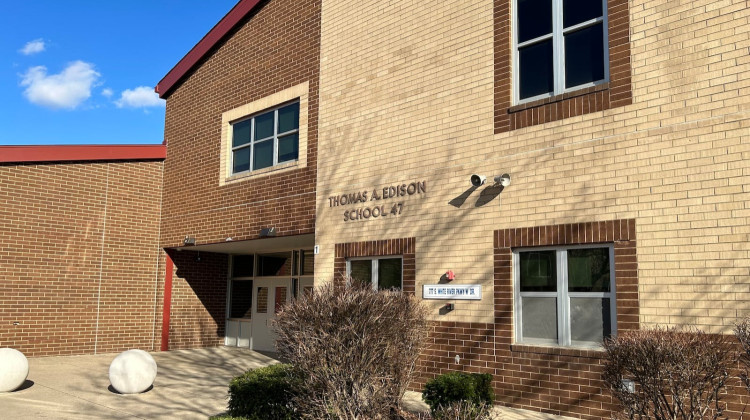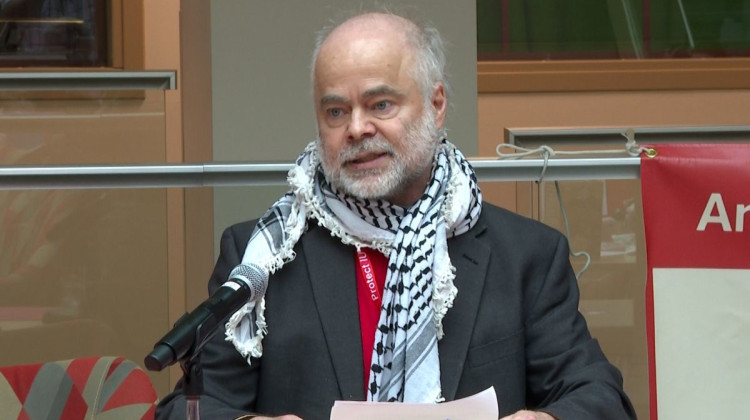
Christopher Pack has been honing his artistic skills since he was just a kid. (Steve Burns/WFIU-WTIU News)
High school students are now earning money for getting good grades or visiting a college campus.
The national organization RaiseMe launched the idea of micro-scholarships five years ago. More than a dozen Indiana colleges and universities have partnered with RaiseMe to offer prospective students micro-scholarships. They can earn money in high school and then apply it towards their college expenses.
With the increasing cost of higher education, Raiseme officials tout micro-scholarships as a way to help students pay for school.
How One Student Earned More Than $7,000 For College
Christopher Pack is an artist, and it shows when you step into his room. His wall is lined with a mix of black and white portraits and colorful action scenes.
"I started practicing and really started honing my skills with drawing, and that's how I was able to get this good," he says.
It makes sense that Pack plans to study visual and sports communications in college. He recently graduated as valedictorian from a small charter school in Indianapolis.
He says college wouldn’t have been possible without micro-scholarships.
"With RaiseMe, I was able to see all the achievements I went through, and I said you know what, let me just put them in, see what I get," Pack says.

Pack created a profile on RaiseMe and started following institutions that offer micro-scholarships. From there, he added in his achievements from freshman to senior year, and got an estimate from each school of how much money they would offer him.
Students can receive money for good grades, volunteering and participating in sports. They can range from $75 to up to $6,000 in some cases.
More than a million high schoolers across the country are using the free platform. RaiseMe Director of Partnerships Miles Hodge says that includes about 25,000 in Indiana.
"It really is changing the dynamic, and it’s having students start to think about it earlier and also exposing them to schools they might not have ever thought about before," Hodge says.
More Than A Dozen Indiana Schools Now Partner With RaiseMe
Pack committed to Indiana University-Pudue University Indianapolis. The school just partnered with RaiseMe last year.
Beth Knight, the director of IUPUI’s scholarship office, says the university liked the idea of offering the small scholarships.
"You’re basically encouraging the student to do things that they need to do to really become college prepared anyway, but you’re giving them sort of an allowance in these micro-scholarships along the way, and it makes them feel actively engaged," Knight says.
Indiana State University started offering micro-scholarships a couple years ago.
Associate Vice President for Enrollment Management Richard Toomey says higher education institutions used to focus their recruitment efforts on juniors and seniors. But he says micro-scholarships allow them to do meaningful outreach earlier.
"If a student comes and takes a college tour and actually registers through our admissions office and experiences campus for a day with us, we will actually award them a one time, $500 scholarship to actually enroll in Indiana State," Toomey says.

High school students can earn money starting their freshman year. (James Vavrek/WFIU-WTIU News)
Some Say It's Not The Priority For High-Need Students
Although experts say micro-scholarships can be a good recruitment strategy, one high school advisor says they're just not the priority for her district.
Wendy Skibinski is the director of college and career readiness for Wayne Township. She says more than 75 percent of the kids in the district receive free or reduced lunch. She says, for these students, high dollar funding is the focus.
"With our low-income scholars, the first stop is with our FAFSA," she says. "The FAFSA is going to help them to identify whether they’re receiving pell aid and all those different types of financial awards. Those are always going to trump any type of micro-scholarship."
Lumina Foundation Strategy Director Haley Glover says universities need to make sure low-income students have the resources they need to get to college, but she says they can’t stop there.
"Being able to support students once they get to college is equally if not more important than getting students to the door of the college," Glover says.
Since the platform is so new, there’s not much data to measure its impact. But Hodge says some schools are seeing higher GPAs with students using micro-scholarships and more students staying enrolled on average. And maybe most importantly, he says it encourages high schoolers to start thinking about their finances earlier.
"The value of education has never really been focused on more than it is now," Hodge says. "Obviously there’s a lot of talk about student debt, so really finding the types of aid that can help students pay for college and college affordability is really important."
That’s why it was so important for Pack to find multiple ways to pay for school. He knew his parents couldn’t, so after receiving $7,370 in microscholarships, he applied for more scholarships.
"I just found what’s out there, and RaiseMe just kind of was that push to say hey, there’s more out there, you just gotta look for them," Pack says.
Pack started at IUPUI this semester, and his tuition costs are completely covered.
 DONATE
DONATE








 Support WFYI. We can't do it without you.
Support WFYI. We can't do it without you.